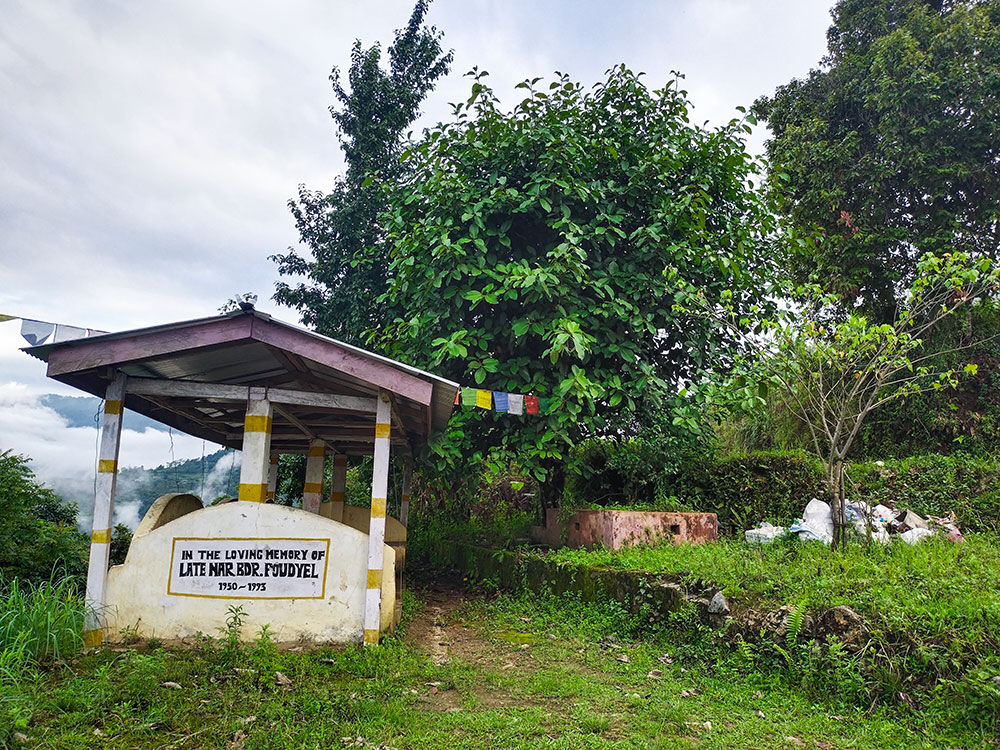YK Poudel
Dagana—Every year, the sons of the Poudyel family in Dogak come together to honour the memory of their late father, Nar Bahadur Poudyel. They perform a special ritual—Shraddha — on the anniversary of his passing.
Shraddha is a ceremony performed by the Hindu faith to pay homage to their deceased ancestors.
To immortalise their father’s memory, the Poudyel family decided to build a chautari, a traditional resting place, at a strategic location in the village. They chose a spot at the tri-junction of a road where the people pass by daily. The chautari would serve as a shelter for tired travellers and also as a symbol of remembrance for their beloved father.
In 2015, the family obtained approval from the gewog administration for the construction of the chautari. They believe that building such structures helps in the liberation of the deceased, and as part of the process, they planted a pair of peepal and banyan trees.
The trees are said to be one of the four cursed incarnations of the Lord Vishnu. While, some believe it is a symbol of the Trimurti, a confluence of the three supreme deities of the Hindu mythology – Lord Brahma is represented in the roots, Lord Vishnu is believed to be the trunk, and Lord Shiva is believed to be the branches.
The chautari holds a special significance, providing a place of peace and rejuvenation for travellers. It is said that the support from the family and community is so powerful that it can lead the departed soul towards liberation.
“We believe in liberation of the dead through construction of such structures,” said Poudyel.
“The tired travellers will rest here, recover while admiring the scenery, and breathe fresh air from the surrounding. The merit will be passed to the deceased,” he said.
According to him, after a parent is dead, marking the tithi, the members of the family perform the shraddha, the rites of offering water, milk and prayers for the ancestors.
In the southern Bhutanese culture, chautaris are built in various locations and hold a rich history of being gathering spaces for the public. In the past, they offered shelter for travellers during rain and sun. Now, they are often used for village meetings and religious ceremonies.
Pandit Motikar Bhattarai explains that performing Shraddha is a moral duty for individuals to honour their ancestors and pray for their immortality or ultimate liberation. While both Hindus and Buddhists perform this rite, there are some differences in how they conduct it. The key aspect is that the ritual should be done with pure intentions and devotion.
Chautaris, he said, according to Hindu scriptures, is a shelter that provides peace and rejuvenation of energy for others and paves the way to liberation for the deceased. “The support from the family and community is so potent that a person bearing the karma in hell may as well be liberated.”
They have a rich history of serving as gathering spaces for the public. In the past chautaris were a place where one had the luxury of shelter during rain and sun, or tired traveller(s) could rest for the night.
The peepal and banyan trees are supposed to provide a home to birds and shelter for animals, which in turn will help the deceased bear good karma. The owner of the trees, however, must perform the moral duty with the marriage of the couple God and Goddess.
During important events like pujas and death anniversaries, families continue the tradition of making food, water and milk offerings at the chautaris, paying their respects to their ancestors.
Poudyel, however, expresses concern about the potential decline of this cultural practice, fearing that younger generations may not value these traditions as much. “I hope that by imparting the significance of these values through logical explanations during puran and on the day of shraddha, our community can help preserve and pass on our cultural heritage.”
So, every year, families gather at the chautaris and continue the age-old practice of making offerings of food, water, and milk, paying their respects to their ancestors and honour their memories.


